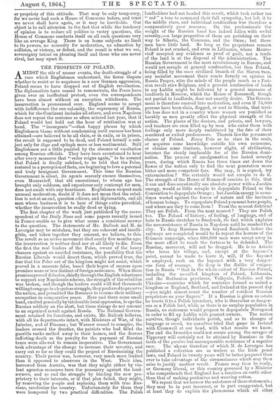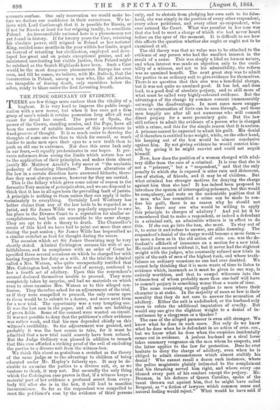THE PROSPECTS OF POLAND.
AMIDST the stir of nearer events, the death-struggle of a race which Englishmen understand, the fierce dispute whether to resist or to acquiesce in a new German aggression, Poland seems to have dropped out of English recollection. The diplomatists have ceased to remonstrate, the Peers have given over an ineffectual protest, even the correspondents have been almost without an exception withdrawn. The insurrection is pronounced over. England seems to accept with indifference the one calamity, the supremacy of Russia, which for the Continent includes all others, and even Napoleon does not repeat the sentence so often uttered last year, that if Poland would but hold out the hour of retribution was at hand. The "insurgents "—that happy phrase by which Englishmen blame without condemning until success has been attained—are believed to be all slain, or in exile, or in prison, the revolt is supposed to be dead, and Poland herself a sub- ject only for ;loge and epitaph more or less sentimental. Still Englishmen are a little puzzled by the absence of exultation among Russian officials. They have been accustomed to hear after every massacre that "order reigns again," to be assured that Poland is finally subdued, to be told that the Poles, restored to a perception of facts, are beginning to love a paternal and truly benignant Government. This time the Russian Government is silent, its agents scarcely excuse themselves, even Mouravieff, that old executioner, to whom age has brought only coldness, and experience only contempt for men, does not exult with any heartiness. Englishmen suspect such unusual moderation; doubt if it does not mean that the rebel- lion is not at an end, question editors, and diplomatists, and all men whose business it is to hear of things extra-parochial, whether the insurrection be really dead or dying.
The first chapter of the work just published by the corre- spondent of the Daily News and some papers recently issued in France enable us to give what seems a consistent answer to the question. The statements of Mr. Bullock and M. de Lavergne may be mistaken, but they are coherent and intelli- gible, and taken together they amount, we believe, to this. The revolt as an active movement died nearly five months ago; the insurrection is neither dead nor at all likely to die. From the first the real leaders of the Poles, aware of the heavy chances against an unaided resistance, the possibility that the Russian Liberals would desert them, which proved true, the fear that the Poles out of the kingdom might not assist, which proved in a measure false, based their hopes of success upon promises more or less distinct of foreign assistance. When those promises proved delusive, chiefly through the English reluctance to support any Napoleonic scheme, the strength of the rebellion was broken, and though the leaders could still find thousands willing to engage in a hopeless struggle, they preferred to preserve the nation, and permitted the Russians to resume their military occupation in comparative peace. Here and there some small band, excited generally by intolerable local oppression, keeps the Russian soldiery on the alert, but these risings do not amount to an organized revolt against Russia. The National Govern- ment retained its functions, and exists, Mr. Bullock believes, with all its departments intact, with Ministers of War, of the Interior, and of Finance ; but Warsaw ceased to conspire, the leaders crossed the frontier, the patriots who had filled the guerilla ranks melted away to their homes, and the decrees inflicting death as the penalty for the payment of Russian taxes were allowed to remain inoperative. The Government took advantage of the change to increase their severity, and carry out so far as they could the project of Russianizing the country. Their power was, however, very much more limited than it appeared to observers in the West. Their idea, borrowed from Austria, was that they might either by vio- lent agrarian measures turn the peasantry against the land- owners, and so end the struggle by binding the new pro- prietary to their interests, or if that plan failed, they might, by removing the people and replacing them with true Rus- sians, reeolonize the country. Unfortunately for them they were hampered by two practical difficulties. The Polish landholders had not headed this revolt, which took rather too " red" a tone to command their full sympathy, but left it to the middle class, and individual confiscation was therefore a comparatively poor resource. On the professionals the weight of the Russian hand has indeed fallen with awful severity,—a large proportion of them are perishing on their way to Siberia, the Caucasus, and the Oxus ; but these men have little land. So long as the proprietors remain Poland is not crushed, and even in Lithuania, where Moura- vieff accepted any evidence as proof of guilt, not a tenth of the land is at the disposal of the Administration. The Russian Government is the most revolutionary in Europe, and would not scruple at general confiscation, but then Poland, being filled by the more civilized branch of the Slavon race, any socialist movement there reacts fiercely on opinion in Russia Proper, stirs the minds of the people much as a Pari- sian revolt stirs Belgians, and a general confiscation of lands in say Lublin might be followed by a general massacre of landlords in Moscow, which the House of Romanoff, though not partial to landlords, does not exactly desire. The Govern- ment is therefore coerced into moderation, and even if 75,000 persons have been slain, flogged, or sent to Siberia, that terri- ble loss does not in a country where women are punished as harshly as men greatly affect the physical strength of the nation. The places of the doctors, and priests, and lawyers, and teachers are soon filled up by men who enter them with feelings only more deeply embittered by the fate of their murdered or exiled predecessors. Therein lies the permanent chance of Poland. Every Pole as he rises in the scale, or acquires some knowledge outside his own commune, or obtains some tincture, however slight, of civilization, becomes the steady implacable foe of the Russian domi- nation. The process of amalgamation has lasted seventy years, during which Russia has three times cut down the flower of the nation only to find the next generation more bitter and more competent foes. She may, it is argued, try extermination ? She certainly would not scruple to do it. The strength of the House of Romanoff consists in this, that it can and does occasionally use absolute power with a Jacobin energy, would as little scruple to depopulate Poland as tho Convention to depopulate Orange ; but Jacobin energy is some- times wasted against the forces of nature and the instincts of human beings. To repopulate Poland you must have people, and where are they to come from ? From the nearest districts? They are Polish. From the next nearest ? They are Polish too. The Poland of history, of feeling, of language, and of hate to Russia stretches to Smolensk, the fact which explains the non-resistance of Russia to Napoleon until he reached that city. To drag Russians from beyond Smolensk before the railways are completed would be to repeat the horrors of the Crimean campaign, when 600,000 men were swept away in the mere effort to reach the fortress to be defended. The Russian, moreover, will not be dragged. He is an Asiatic who loves his village, and, except at the bayonet's point, cannot be made to leave it, will, if the bayonet is employed, rush on the bayonet with a very danger- ous form of courage. So deep is the dislike of emigra- tion in Russia "that in the whole extent of Russian Poland, including the so-called kingdom of Poland, Lithuania, and the Ruthenian provinces, Volhynia, Podolia, and the Ukraine—countries which for centuries formed as united a kingdom as England, Scotland, and Ireland at the present day —you might almost count the number of resident Russian proprietors on your fingers." If a Russian is given an estate he trusts it to a Polish intendant, who is thereafter as danger- ous as a Polish lord, while as there is no surplus population in Russia, no statesman would propose to depopulate Novogorod in order to fill up Lublin with peasant owners. The nation survives, though individuals perish, and as to changes of language or creed, we ourselves tried that game in Ireland with Cromwell at our head, with what results we know. The end the Ironsides could not secure among the savages of Tipperary will certainly not be attained by Russians in the teeth of the passive but unconquerable resistance of a superior race. The ukases therefore of which M. de Lavergne has published a collection are as useless as the Irish penal laws, and Poland in twenty years will be better prepared than ever to take advantage of the circumstances which may then arise to justify another revolt. France may then be ready, or Germany liberal, or this country governed by a Minister who comprehends that England has a function on earth other than that of making penknives and weaving cotton. We repeat that we borrow the substance of these statements ; they may be in part incorrect, or in part exaggerated, but at least they do explain the phenomena which all other accounts confuse. One only reservation we would make be- fore we declare our confidence in their correctness. We be- lie° with Lord Castlereagh that it is possible for Russia, or if not for Russia at least for her reigning family, to conciliate Poland. An irreconcilable national hate is a phenomenon not yet found in history. If for twenty years the Czar, retaining his absolute power, still reigned in Poland as her national King, resided some months in the year within her limits, urged on instead of retarding her civilization, employed and deve- loped her great and on points exceptional genius, and ad- ministered unrelenting but visible justice, then Poland might be subdued as the Scotch Highlands have been. Such a Czar woulit be the most dangerous phenomenon Europe has ever seen, and till he comes, we believe, with Mr. Bullock, that the insurrection in Poland, among a race who, like all Asiatics, are incapable of fearing death, only smoulders below the ashes, ready to blaze under the first favouring breath.































 Previous page
Previous page